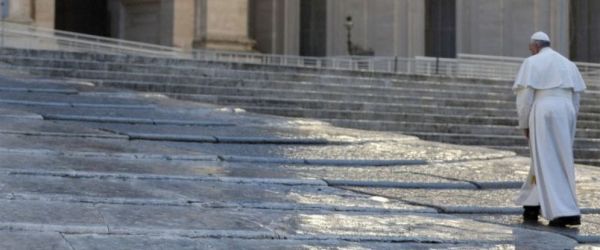"Service" and "gratuitousness": these are the two key words around which Pope Francis built the meditation of the Mass celebrated at Santa Marta on the morning of Tuesday 11 June. They are the fundamental characteristics that must accompany the Christian "along the way", the Pontiff said, along that journey, that "going" that always characterises life, "because a Christian cannot remain stationary".
The teaching comes directly from the Gospel: it is there that we find - as highlighted by the passage from Matthew proposed by the liturgy of the day (10, 7-13) - Jesus' instructions for the apostles who are sent. A mission that, said the Pope, is also that of "the successors of the apostles" and of "each Christian, if sent". Therefore, first of all, 'the Christian life is to make a way, always. Not to stand still'. And in this going, what does the Lord recommend to his own? "Heal the sick, preach saying that the kingdom of heaven is at hand, raise the dead, cleanse the lepers, cast out demons". That is, "a life of service".
Here is the first fundamental datum highlighted by the Pontiff: 'The Christian life is to serve'. And it is very sad, he added, to see "Christians who at the beginning of their conversion or their awareness of being Christians, serve, are open to serve, serve God's people", and then, instead, "end up serving God's people. This does so much harm, so much harm to the people of God". The vocation of the Christian therefore is 'to serve' and never 'to serve oneself of'.
Continuing his reflection, Francis then moved on to a concept that, he stressed, "goes right to the core of salvation: 'Freely you have received, freely give'. The Christian life is a life of gratuitousness'. It is clear from Jesus' recommendation to the apostles sent that "salvation cannot be bought; salvation is given to us freely. God saved us, he saves us free of charge. He does not make us pay'. It is, the Pope explained, a principle "that God has used with us" and that we must use "with others". And it is "one of the most beautiful things" to know "that the Lord is full of gifts to give us" and that only one thing is asked of man: "that our heart be opened". As in the prayer of the Our Father, where 'let us pray, let us open our hearts, so that this gratuitousness may come. There is no relationship with God outside gratuity'.
Considering this cornerstone of Christian life, the Pontiff then pointed out possible and dangerous misunderstandings. Thus, he said, "sometimes, when we need something spiritual or a grace, we say: 'Well, I'm going to fast now, I'm going to do a penance, I'm going to do a novena...'". This is all well and good, but "let us be careful: this is not to 'pay' for grace, to 'acquire' grace; this is to enlarge your heart so that grace may come". Let us be clear, in fact: "Grace is free. All God's goods are free. The problem is that the heart shrinks, closes and is not capable of receiving so much love, so much gratuitous love'. Therefore 'everything we do to obtain something, even a promise - "If I have this, I will do that" - this is enlarging the heart, it is not entering into haggling with God... No. With God there is no bargaining". With God, 'only the language of love and the Father and gratuitousness applies'.
And if this is true in the relationship with God, it is also true for Christians - 'Freely you have received, freely give' - and, Francis emphasised, especially for the 'pastors of the Church'. Grace "cannot be sold," he reiterated, adding: "It hurts so much when you find pastors doing business with God's grace: 'I will do this, but this costs so much, this so much...'. And God's grace stays there and salvation is a bargain'. All this, he emphatically reiterated, 'is not the Lord. The Lord's grace is free and you must give it freely'. Unfortunately, he explained, in the spiritual life there is "always the danger of slipping into payment, always, even talking to the Lord, as if we wanted to give a bribe to the Lord". But the relationship with the Lord cannot go "down that road".
Therefore, the Pontiff reiterated, no to the dynamic of the type: 'Lord if you do this to me, I will give you this'; but, eventually, yes to a promise so that with it one's heart may be enlarged 'to receive' what 'is gratuitous for us'. And "this relationship of gratuitousness with God is what will help us then to have it with others both in Christian witness and in the pastoral life of those who are pastors of God's people".
"This is how the Pope summed up his reasoning at the end of his homily'. "The Christian life," he said, "is going. Preach, serve, not 'serve of'. Serve and give for free what you have received for free'. And he concluded: 'Let our life of holiness be this widening of the heart, so that God's gratuitousness, God's graces that are there, gratuitous, that He wants to give, can reach our heart.
[Pope Francis, St. Martha, in L'Osservatore Romano 11.06.19]












